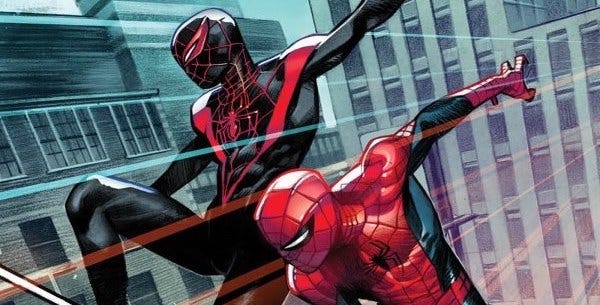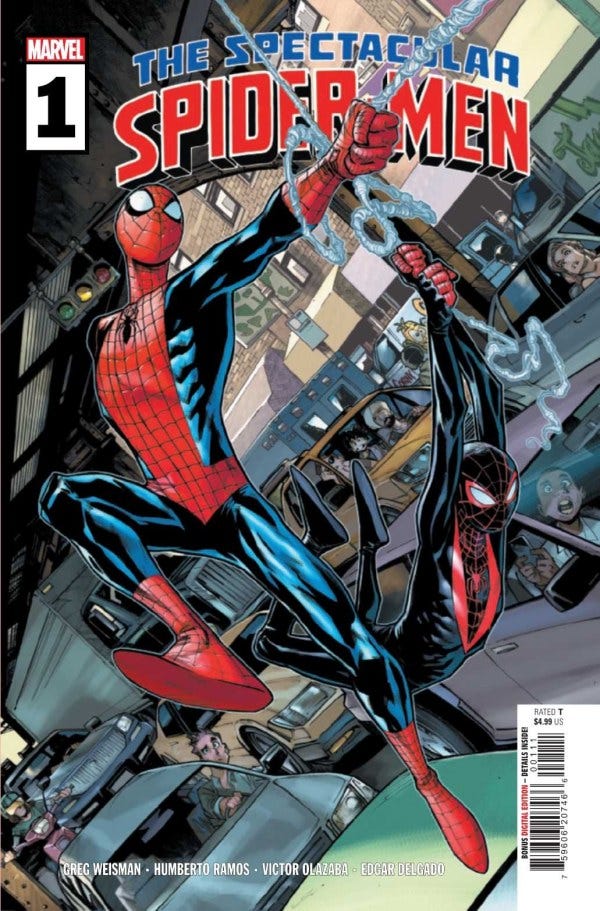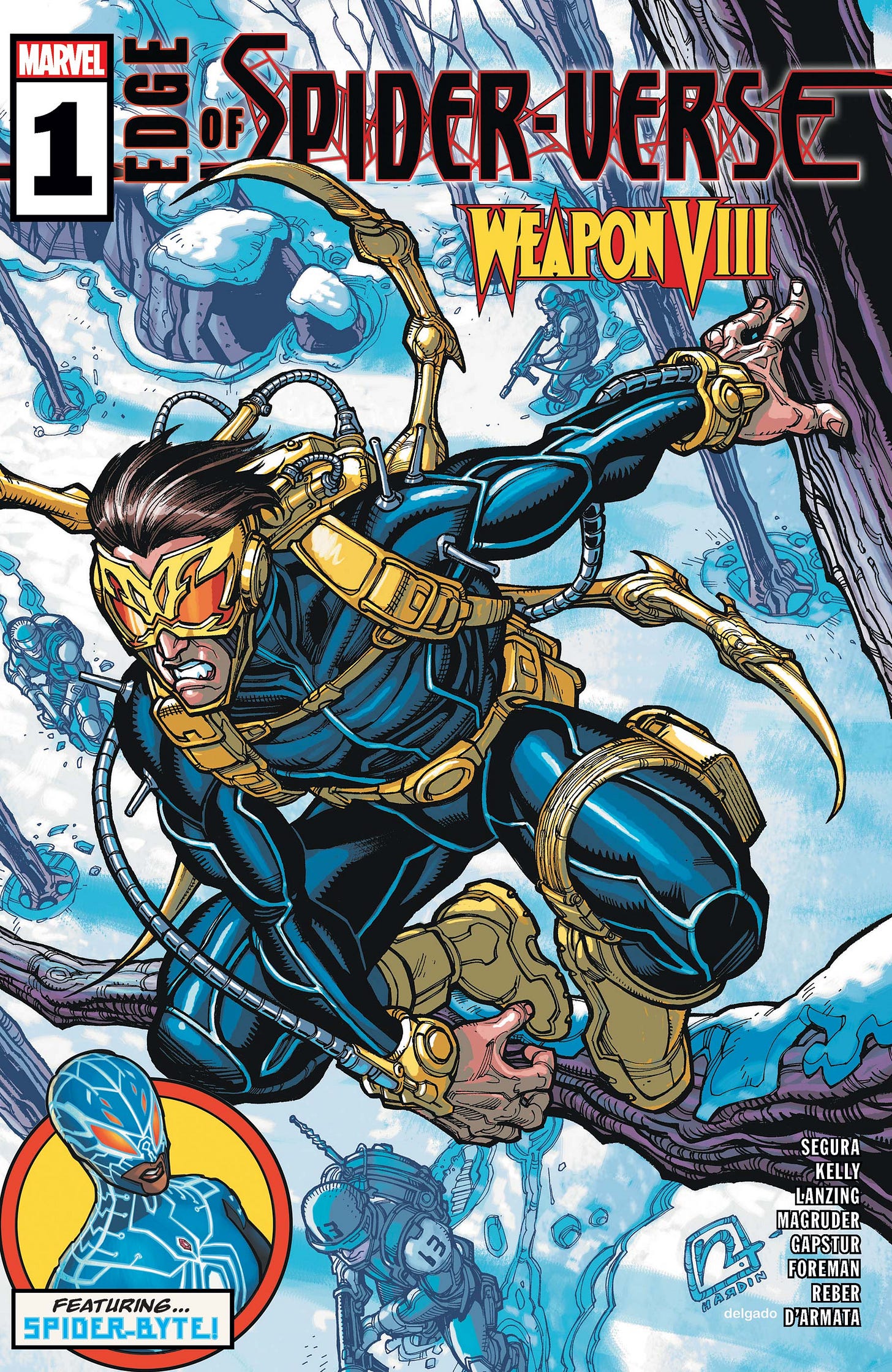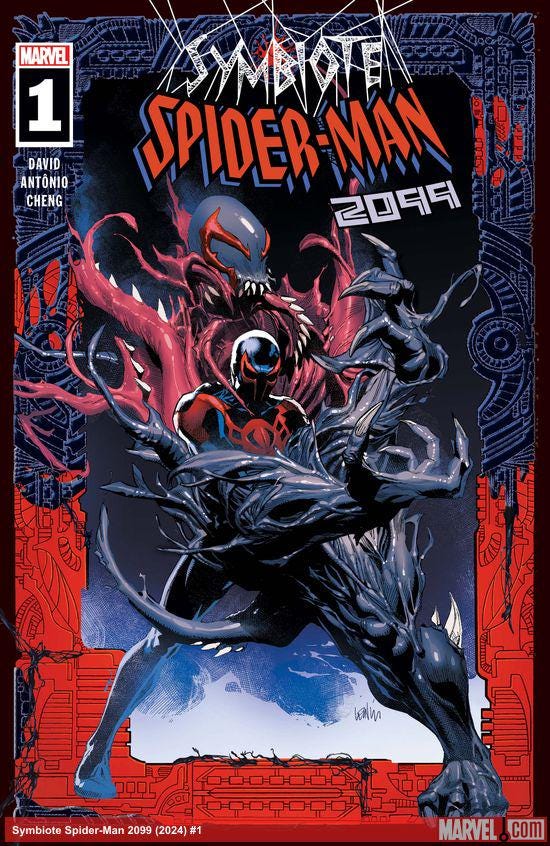Thanks for indulging our horrible Spin Doctors joke. Hi, we are Dapper Dan Gvozden and Mischievous Mark Ginocchio, co-hosts of the Amazing Spider-Talk podcast. With each newsletter we hope to give you greater access into our thoughts on the world of Spider-Man!
On the past few weeks of the Amazing Spider-Talk Podcast we’ve been reviewing the final issues of “Gang War”, but in this Substack we wanted to use this entry to discuss our thoughts on the recently launched The Spectacular Spider-Men #1 and review Symbiote Spider-Man #1 and Edge of Spider-Verse (vol. 4) #1. But first, please subscribe to this Substack!
And, if you want to help support what we do, plus get bonus episodes of the Amazing Spider-Talk, digital artwork, prints in the mail, and early access to every episode of the show, please check out our Patreon. Putting this together takes a lot of time, energy, and funds, so we would be hugely appreciative of your support.
We’ve even got our review of Amazing Spider-Man (vol. 6) #45, for you to watch/listen to! Here’s our humorous recap of the issue that teases a part of our full review:
Now, let’s get to our discussion of The Spectacular Spider-Men #1!
Is it “Spectacular”?
The following is a discussion of The Spectacular Spider-Men #1. There are minor spoilers for the story, so it is probably best that you have read the issue prior to reading our conversation.
Dan: Well, Mark, after we spent a previous Substack talking about all the potential that a Spectacular Spider-Men team-up book might have, the day is upon us and the book is in our hands. Our prevailing thought, prior to its release, was that this was a title that Marvel needed to publish years ago, and that it was truly bizarre that they hadn’t. The team of “Spectacular Spider-Man”’s (the TV show) showrunner Greg Weisman and superstar, Spider-Man artist Humberto Ramos seemed like a pretty sure bet, at least in terms of putting top talents familiar with Spider-Man on what could be a defining title of this current line of Spider-Man comics. We didn’t know much about the plot of this book, other than that Jackal would be involved, but figured that putting together Peter and Miles for a book that focused on them would be enough to justify the existence of this book.
How right or wrong were we? Basically, I’m asking, what’d you think of The Spectacular Spider-Men #1?
Mark: I wouldn’t say the first issue hit the concept out of the park, but I think I gleaned enough potential from the comic to be intrigued enough to give this a puncher’s chance of being something I look forward to each month. What probably frustrated me the most about the comic was the framing of the narrative and the constant jumping forward and backwards in time. It disrupted the flow of the story for me, but at the same time, I don’t suspect that this is going to be a regular gimmick for Weisman.
What I ultimately wanted out of this book — some actual characterization of the Peter/Miles relationship — I feel the comic *mostly* delivered. This particular issue still takes some superficial shortcuts when it comes to Peter and Miles (Peter is less of a mentor and/or father figure and instead more of a dorky older brother who also hasn’t progressed past 1997 in terms of the cultural zeitgeist), but the fact that it seems so intent on getting the two of them together whether it’s for Spider-Man business or just hanging out at The Coffee Bean and having awkward run-ins with ex-girlfriends of Flash Thompson, I’m at the very least, modestly happy.
If this comes across like a very milquetoast review of this comic, I guess it is. But honestly, I wanted more out of this, but also am cognizant of the fact that maybe my expectations were unrealistic. That dynamic from the Spider-Verse movies is not really part of any 616-comic book canon, so to hope it’s going to be magically captured is probably a pipe dream.
So let’s start with that from your end, Dan. Did you have a certain expectation of how Peter and Miles would be captured in this debut issue, and if so, how did this comic go about meeting it?
Dan: My expectations were that I would, at the very least, get solid characterization of Peter and Miles and a unique look at the relationship they have as two different Spider-Men. You got to the heart of my problems with this initial chapter in your characterization of the writing of Peter, plus your mention of the random cut-aways that make no sense in the context of this individual comic. Peter reads as an older brother rather than a mentor figure in Miles’ life and, I’ll go a step further, I think that the two characters are written with almost the same exact voice. When they are not it’s mostly… for lack of a better word: cringe. Reading the line “a little flirt don’t hurt”, coming from Miles, actually “hurt”, especially when Cody Ziglar seems to be effortlessly writing Miles with such a specific voice over in Miles Morales: Spider-Man.
Peter, too, acts like the worst version of the man-child that would show up every now and then in Dan Slott’s run, but this time for an entire issue. We’ve talked about this endlessly on our podcast, so I won’t belabor it here, but I really don’t have much love for writers who turn Peter into a nonstop, meta-joke machine. I’ve always understood that Peter’s humor, and Miles’ by extension, always comes in the face of adversity, as a way of teasing his foes, to punctuate a moment of overwhelming terror, or as self-deprecating comments to himself. But here we get full-length, meta-humor between Peter and Miles about their activities as Spider-Men, including several nods to their publication history. For me, it didn’t work. So, it’s hard for me to give this book my full endorsement, as a fan of these two characters, when they don’t read like the characters I’ve enjoyed over the years.
That’s not to say that I thought this was all bad, far from it. Some of the scenarios are humorous, including a sequence with Peter trying to become a regular at the coffee shop (including a dig at Paul too, which suggests the Spider-Office has a sense of humor about how much hate they’ve been getting). And, Humberto Ramos blows the lid off of this story with a ton of high-flying, web-slinging action between the Spider-Men and a monstrous Jackal. The tone of humor matches well with his art to make this a youthful and light story. Given the darkness in the Wells run, I don’t think it is a bad thing to get such a friendly, colorful, and upbeat book as this and Spider-Boy in the Spider-Man line, I just wish they felt better integrated into the world of Spider-Man that I’m reading in Amazing Spider-Man.
The book ends with a tease of a big Jackal-related mystery and a smoking skeleton. Are you down for another twisty-turny Jackal mystery at the heart of this title?
Mark: I mean, anyone who has been following me on Chasing Amazing and Amazing Spider-Talk for the past decade and change knows the one thing Mark loves more than any other, is a mystery character. Give me mysteries. All the mysteries. Mason Banks forever!
Now that I’ve gotten that out of my system, while I wasn’t in love with the characterization of Peter and Miles, I was far more open-minded to it until we got to the very end and I felt like I had to start guessing about who the mystery villain is going to be revealed to be. The Jackal has long been a pain in my rear when it comes to my comic book enjoyment because the fun of the character is basically completely lost for me when he’s given an endless cheat code of ways to survive and fight another day (except when he plays a supporting role, like in “Spider-Island”). At least in this context, I was settled into the idea that we had a Jackal/Hulk hybrid that would probably just be the monster du jour here and promptly forgotten since this isn’t happening inside a comic written by Zeb Wells or Dan Slott. Instead, we get a mystery corpse and a mysterious person on a phone and I’m already feeling my blood pressure raise that I have to sit here and speculate about what it all means. Let us always remember that if Stan Lee and Steve Ditko just decided to show a wealthy businessman with tootsie roll hair get under a Green Goblin mask back in 1964 we would NEVER HAVE TO ENDURE ANOTHER SPIDER-MAN MYSTERY VILLAIN AGAIN.
So now that I’ve emptied all that onto the page, let’s go back to the creative team here. As you noted, Ramos was at his most explosive self here. It was such a joy to go on this journey with him. Unfortunately, where the disappointment lay was in Weisman’s storytelling and characterization. It just seemed so random to me since we’ve seen him create really character-centric (and accurate) Spider-Man stories with the “Spectacular Spider-Man” animated series. That show was awesome and it’s a shame it didn’t have a longer shelf-life.
Do you think there’s enough runway from this first issue for Weisman to course correct here? Would the Peter from his “Spectacular” series (or from “Spider-Man: Into the Spider-Verse”) even be appropriate in this world? Or are we just wish-casting a status quo that doesn’t truly exist in the 616 anymore?
Dan: I’m not even asking that we get a middle-aged Peter Parker here, my ideal would be that he’d be similar to the character from the Wells run. Late 20’s, an experienced hero, still prone to all of the typical mistakes that he makes, but someone who takes his mentorship role as Spider-Man as an extension of his weighty responsibility. I like Weisman’s Peter from the “Spectacular” television series, but he’s also a quippier, younger character than what I feel should be on the page in these comics. That interpretation works on the screen in a high school setting, but when you are trying to draw a distinction between an older Peter and a high school Miles… not so much.
I do think there is enough runway here to course correct, mostly because my role on our show is as eternal optimist. But, I don’t feel the synergy of Bendis’ original Spider-Men here, or that the ambitions of this comic are anywhere near that lofty, if you hold that miniseries in high regards. This title reads like a writer that was brought in as a freelancer to sell a few comics on his name and the concept, to produce a sort of evergreen Spider-Man book that would be good for newer and younger readers of the line. Additionally, the absolutely bizarre cutaways around the globe to random characters, which has no clear tie back to the ongoing events of this comic, suggest that this was a story written for the trade, which is odd considering Weisman’s previous, sequential storytelling credits. Or, it was just sloppily edited. Or, I just missed the point entirely.
What I’m currently interested in is the fun resurfacing of Spider-Man bit-players returning and Weisman having fun with that history, which, I’ll admit, is a shallow thrill. That said, it has been forever since we’ve visited The Coffee Bean, Empire State University, Sha-Shan, Mr. Warren, etc. If this is going to be a fun romp through Spider-Man history, I can appreciate it on that level while lowering my expectations of what I hoped this book could be. I’m not sure that I’m excited to wade into the territory of cloning and all the messiness that typically accompanies it, but I’m open to being surprised.
We’ve gotten a bunch of other kick-offs to new Spider-Man series recently: Symbiote Spider-Man 2099, Spider-Boy, Ultimate Spider-Man (vol. 3), and even Edge of Spider-Verse (vol. 4). The Spider-Office’s output seems larger than ever. Where do you think Spectacular Spider-Men fits in, and what are your thoughts about the overall line at this moment in time?
Mark: Well, I think you hit the nail squarely on the head in terms of the target audience for this comic and the overall marketing for it. Outside of Marvel’s few flagship books (Amazing Spider-Man being one of them), there seems to be less and less interest in telling long-form interconnected stories that build to something. Which is funny because when the Marvel Cinematic Universe launched in the late 2000s, it seemed like one of the biggest fears from comic book readers would be constant synergy between the shared universe of the films and the shared universe of the comics.
As we discussed with Spider-Man 2099 writer, Steve Orlando, in our interview with him, the Spider-office seems to be churning out a collection of mini series and “special event” ongoings that are being written with the trade market in mind, so more casual readers who are watching the movies on Disney+ or catching animated series have an easy access point. And look, as dismissive as that last sentence sounds, I get it. Comics, like every other print medium right now are in a fight for survival. If publishing books like 2099 or Spider-Gwen in small, bite-size installments while special ongoing books like Ultimate or Spectacular Spider-Men don’t have a set end date, but also don’t seem all that destined to last more than one or two trade collections, keeps the lights on, so be it. I’d rather have the options to jump in and jump out on this series, then get overly invested for some random number of issues (i.e. Superior Foes of Spider-Man) and then watch the book get its knees capped. In truth, I don’t know if Spectacular Spider-Men is for me, but I also don’t suspect the investment of my time and wallet will be that profound.
Swarm’s B(ee)-Title Reviews
With every new edition of the Amazing Spider-Talk Substack, Dan and Mark will venture to write short reviews of all the various Spider-Man books (and major Marvel releases) that have released since the previous newsletter. Sometimes our arch-villain Swarm might chime in as well. So “bee” prepared!
Edge of Spider-Verse (vol. 4) #1
Dan: As much as I have loathed the various “Spider-Verse” events, I always have a blast with the anthology format of the Edge of Spider-Verse miniseries. Without the premiere miniseries we wouldn’t have gotten such exciting takes on the Spider-Man mythos as Spider-Gwen or Peni Parker. I mean, heck, Mark and I were amongst the first to champion Spider-Gwen back when she first appeared, hosting both Jason Latour and Robbi Rodriguez on our podcast the very night that comic hit stands. The results of the series have been a mixed bag over the years, but that’s kind of what you get with an anthology format. For me, it’s worth the misses for the exciting hits. This volume’s premiere issue gives us Weapon VIII and… he’s a hit. Giving Spider-Man the Wolverine treatment and playing with lost memories, body horror, and clandestine government organizations is a lot of fun.
Artist Travel Foreman’s work on the various Spider-Man titles over the years, especially Amazing Spider-Man: Civil War II, have all been hits for me. The same is true here, as he renders and melds horrific biological and mechanical violence together to create Weapon VIII. Collin Kelly and Jackson Lanzing’s script works well too, but relies too heavily on teasing the mystery of Weapon VIII’s identity, when the answer is exactly what any reader might assume. The Spider-Byte story, which formally brings the character back from her first appearance in Vault of Spiders #1 and subsequent role in “Spider-Man: Across the Spider-Verse”, is fun enough inconsequential fun, but hardly crafts a story that truly sells what would make a digital version of Spider-Man unique.
The only real bummer here is that this is all building to another “Spider-Verse” event. I enjoy reading writer Alex Segura’s version of Spider-Man 2099, especially after reading his book, Araña and Spider-Man 2099: Dark Tomorrow, even if it’s not quite as distinct as Steve Orlando’s William Gibson-inspired take on 2099. I just find the whole notion of various Spider-Men teaming up to take on a multiversal threat so exhausting, especially after “End of the Spider-Verse” wrapped just a year ago. I truly think there’s only enough juice left in the mutliversal squeeze to get me through “Spider-Man: Beyond the Spider-Verse” before I need to take a serious break from the genre altogether.
Mark: Similar to Dan, I’ve never really been a superfan of the “Spider-Verse” event as a general premise, but separate from Dan, outside of the first Edge of Spider-Verse minis, none of these anthologies have really grabbed me, in large part because the Spider-characters being created or highlighted in these stories don’t really have a “hook” that makes me want to read more about them.
So it was a pleasant surprise just how much I enjoyed this latest iteration, specifically because of the very first story starring Peter Parker, Weapon VIII. While we’ve seen a “darker” version of Peter in other storylines before, Weapon VIII was probably the most hauntingly effective twist on the character I’ve seen to date. This was due in large part to the fact that at his core, Weapon VIII did seem like an inherently “true” version of Peter — one who was convinced he was doing the responsible thing, but due to the corrupt nature of his handlers, acted in a way that from the reader’s perspective was highly irresponsible. As a result, we got a great inversion of the classic “power and responsibility” characterization, and now I want to read more about this particular version of the character.
Past this issue, the Spider-Byte and 2099 tales seemed like more of the same (aka about what I would expect from one of these otherwise forgettable anthology issues), though with excellent artwork all around (I share similar adoration for Travel Foreman). But like Dan said, Weapon VIII is the big time takeaway from this whole comic.
Symbiote Spider-Man 2099 #1
Dan: I wasn’t prepared for what I was getting with Symbiote Spider-Man 2099 #1. Maybe I missed this detail in the solicitations, but this title turns out to be Peter David returning to his original series, before the whole universe had been rebooted half a dozen times, and continuing where he left off as if the title was never cancelled. The original Spider-Man 2099 (vol. 1) ended with issue #46, so consider this issue #47 just with a heavy emphasis on the symbiotes of the world of Nueva York 2099. As such, this issue is steeped in the lore of that series, one that I haven’t read in full since that final issue released in 1996. That’s my way of saying that a lot of the details here, including a plethora of homages to Spider-Man 2099 (vol. 1) #1, went over my head or were lost to me.
There’s still a load of fun to be had with this issue. Rogê Antônio’s pencils took me immediately back to the ‘90s, between the skyscrapers of Nueva York and his goopy symbiote designs, which he previously showed off in his work on Venom and Carnage. That said, I feel like I’d need to brush up on the finale of Peter David’s Spider-Man 2099 work before I could truly weigh in on how well this series continues that legacy. I will say though, the original Spider-Man 2099 was ahead of its time, and this issue continues that legacy by not feeling like it is overly steeped in nostalgia in a way a lot of these “flashback” series are.
Mark: Yeah, this is a real tough one for me to get into, because I’m sure I’m going to hurt some feelings with this take. But after getting some legitimate new voices in the 2099-landscape, not only returning to Peter David’s vision, but his vision of the character in the mid 90s when his initial run on Spider-Man 2099 was unceremoniously cancelled seems like such a step backwards for Miguel O’Hara and this universe. It’s not that I didn’t enjoy this comic per se, but so much of it — including the very first visual of the story — was constructed in a foundation of navel gazing for an era that’s past its time.
The fact is, when 2099 was first conceived in the early 90s, the idea of a Spider-Man in the year 2099 felt so farfetched, with its flying cars and radical new language. We’ve obviously progressed more than 30 years (in real world time) since that series debuted and while the world has changed dramatically in that time, all the same, some of the high-minded sci-fi conceptions that were introduced then feel so dated and hokey now — like we still can’t move past the idea of the “future” being something out of “The Jetsons”. As Dan noted, Steve Orlando’s go with the character has given these conventions a nod while moving in a discernibly different direction in terms of universe building and I’m just having a hard time going back. It reminds me of the adage: “it’s ok to look back at the past, but it’s impolite to stare.”
What’s New for the Amazing Spider-Talk?
Since the previous Amazing Spider-Talk Substack we’ve been playing catch up in our public feed on the end of “Gang War”. We just publicly published our review of the penultimate issue of that story:
We hope you enjoyed this thirteenth edition of the Amazing Spider-Talk Substack and that you’ll consider subscribing for our future newsletters.
And, if you haven’t already, please subscribe to our various podcasts, comment below, and consider joining our Patreon:












I mean, I'm so Gen X I bought ASM 300 at a grocery store and skipped school to buy the Beasties Boys' "Check You Head," but even I can't place that Spin Doctors lyric